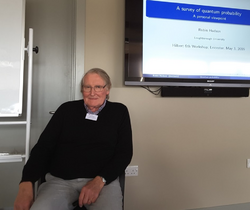Biography:Robin Lyth Hudson
Robin Lyth Hudson | |
|---|---|
 A plenary talk at the EPSRC-LMS-IMA Conference 'Hilbert's sixths problem' in Leicester, May 3, 2016.[1] | |
| Born | 4 May 1940 |
| Died | 12 January 2021 |
| Alma mater | University of Oxford |
| Scientific career | |
| Fields | Mathematics |
| Institutions | University of Nottingham, Loughborough University |
| Doctoral advisor | John Trevor Lewis |
Robin Lyth Hudson (4 May 1940 – 12 January 2021) was a British mathematician notable for his contribution to quantum probability.
Education and career
Robin Lyth Hudson received his Ph.D. from the University of Oxford in 1966 under John T. Lewis with a thesis entitled Generalised Translation-Invariant Mechanics. He was appointed assistant lecturer at the University of Nottingham in 1964, promoted to a chair in 1985 and served as Head of Department from 1987 to 1990. He spent sabbatical semesters in Heidelberg (1978), Austin Texas (1983) and Boulder Colorado (1996). After taking early retirement in 1997, he held part-time research posts at Nottingham Trent University (1997-2005), the Slovak Academy of Sciences (1997-2000) and Loughborough University (2005–21), and a visiting professorship at the University of Łódź (2002) which awarded him an honorary doctorate in 2013.
Hudson was a mathematical physicist who was one of the pioneers of quantum probability. An early result,[2] now known as Hudson’s theorem in quantum optics, shows that the pure quantum states with positive Wigner quasiprobability distribution are the Gaussian ones. Together with PhD students, Robin established one of the first quantum central limit theorems,[3] proved an early quantum de Finetti theorem,[4] and introduced quantum Brownian motion[5] as a non-commuting pair of families of unbounded operators, using the formalism of quantum field theory. He collaborated with K. R. Parthasarathy first at the University of Manchester, and later at University of Nottingham and at Loughborough University, on their seminal work in Quantum stochastic calculus.[6][7][8]
In later papers he developed a theory of quantum stochastic double product integrals and their application to the quantum Yang-Baxter equation, the quantisation of Lie bialgebras and quantum Lévy area.[9]
Selected works
- Hudson, Robin Lyth; Ion,P.D.F.; K. R. Parthasarathy (1982). "Time-orthogonal unitary dilations and non-commutative Feynman-Kac formulae". Communications in Mathematical Physics 83 (2): 261–280. doi:10.1007/BF01976044. Bibcode: 1982CMaPh..83..261H.
- Hudson, Robin Lyth; K. R. Parthasarathy (1984). "Quantum Ito's formula and stochastic evolutions". Communications in Mathematical Physics 93 (3): 301–323. doi:10.1007/bf01258530. Bibcode: 1984CMaPh..93..301H. Archived from the original on 2015-10-28. https://web.archive.org/web/20151028133138/http://link.springer.com/article/10.1007/BF01258530.
- Hudson, Robin Lyth; K. R. Parthasarathy (1984). "Stochastic dilations of uniformly continuous completely positive semigroups". Acta Applicandae Mathematicae 2 (3–4): 353–378. doi:10.1007/BF02280859.
- Applebaum, D.B.; Hudson, Robin, Lyth (1984). "Fermion Ito's formula and stochastic evolutions". Communications in Mathematical Physics 96 (4): 473–496. doi:10.1007/BF01212531. http://projecteuclid.org/euclid.cmp/1103941910.
- Hudson, Robin Lyth; Lindsay,J.M. (1985). "A non-commutative martingale representation theorem for non-Fock quantum Brownian motion". Journal of Functional Analysis 61 (2): 202–221. doi:10.1016/0022-1236(85)90034-5.
- Hudson, Robin Lyth; K. R. Parthasarathy (1986). "Unification of Boson and Fermion quantum stochastic calculus". Communications in Mathematical Physics 104: 457–470. doi:10.1007/BF01210951. http://projecteuclid.org/euclid.cmp/1104115087.
- Hudson, Robin Lyth; K. R. Parthasarathy (1994). "Casimir chaos in a Boson Fock space". Journal of Functional Analysis 119 (2): 319–339. doi:10.1006/jfan.1994.1013.
- Hudson, Robin Lyth; Pulmannová, S. (2004). "Double product integrals and Enriquez quantisation of Lie bialgebras I: The quasitriangularity relations". Journal of Mathematical Physics 45: 2090–2105. doi:10.1063/1.1649796.
References
- ↑ Robin Hudson, "A short walk in quantum probability," Phil. Trans. R. Soc. A 376 (2118) 20170226, 2018; doi:10.1098/rsta.2017.0226.
- ↑ Hudson, Robin Lyth (1974). "When is the Wigner quasi-probability density non-negative?". Reports on Mathematical Physics 6 (2): 249–252. doi:10.1016/0034-4877(74)90007-x. Bibcode: 1974RpMP....6..249H.
- ↑ Cushen, C.D.; Hudson, Robin Lyth (1971). "A quantum-mechanical central limit theorem". Journal of Applied Probability 8 (3): 454–469. doi:10.2307/3212170.
- ↑ Hudson, Robin Lyth; Moody,G.R. (1976). "Locally normal symmetric states and an analogue of de Finetti's Theorem". Zeitschrift für Wahrscheinlichkeitstheorie und Verwandte Gebiete 33 (4): 343–351. doi:10.1007/BF00534784.
- ↑ Cockcroft, A.M.; Hudson, Robin Lyth (1977). "Quantum mechanical Wiener processes". Journal of Multivariate Analysis 7: 107–124. doi:10.1016/0047-259X(77)90035-5.
- ↑ D. Applebaum. "Robin Hudson's Pathless Path to Quantum Stochastic Calculus". Archived from the original on 2016-03-04. https://web.archive.org/web/20160304061146/https://www.applebaum.staff.shef.ac.uk/Hudpath.pdf.
- ↑ Jinqiao Duan; Shunlong Luo; Caishi Wang (2010). Recent development in stochastic dynamics and stochastic analysis. World Scientific. p. preface-x. ISBN 978-9814277266.
- ↑ K.R. Parthasarathy. "Quantum Stochastic Calculus". Archived from the original on 2012-07-28. https://web.archive.org/web/20120728070024/http://www.mathunion.org/Publications/Bulletins/39/parthasarathy.ps.
- ↑ Hudson, Robin Lyth; Pulmannová, S. (2004). "Double product integrals and Enriquez quantisation of Lie bialgebras I: The quasitriangularity relations". Journal of Mathematical Physics. 45: 2090–2105.
External links
